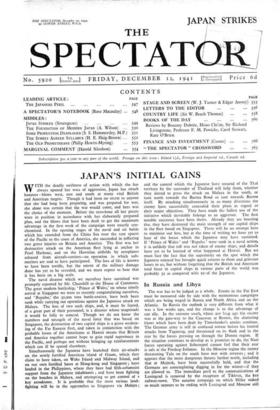JAPAN'S INITIAL GAINS
WITH the deadly swiftness of action with which she has always opened her wars of aggression, Japan has struck hammer - blows west, east and south at many vital British and American targets. Though it had been no secret to anyone that she had long been preparing, and was prepared for war, she alone was certain that the war would come, and hers was the choice of the moment. Before the zero-hour all her pieces were in position in accordance with her elaborately prepared plan, and the blows that have been dealt to get the maximum advantage in the first week of the campaign were exactly syn- chronised. In the opening stages of the naval and air battle which has extended from the China Sea over the vast spaces of the Pacific to the coast of America, she succeeded in inflicting two grave injuries on Britain and America. The first was her destructive attack on the American fleet lying at anchor in Pearl Harbour, and on the Hawaiian airfields by aeroplanes released from aircraft-carriers—an operation in which sub- marines are said to have participated. The loss of life is known to have been terrific, but the extent of the military damage done has yet to be revealed, and we must expect to hear that it has been on a big scale.
The naval disaster which we ourselves have sustained was promptly reported by Mr. Churchill to the House of Commons. The great modern battleship, ' Prince of Wales,' on whose timely arrival at Singapore we were so recently congratulating ourselves, and ' Repulse,' the 32,000 tons battle-cruiser, have both been sunk while carrying out operations against the Japanese attack on Malaya. The loss of two such ships, and, it must be feared, of a great part of their personnel, is a disaster whose magnitude it would be folly to conceal. Though we do not know the numbers and strength of the naval force that was based on Singapore, the destruction of two capital ships is a grave weaken- ing of the Far Eastern fleet, and taken in conjunction with the probable losses of the Americans at Hawaii means that Britain and America together cannot hope to gain rapid supremacy in the Pacific, and perhaps not without bringing up reinforcements which can ill be spared elsewhere.
Simultaneously the Japanese have launched their air-attacks on the newly fortified American island of Guam, which they claim to have taken, on Wake Island and Midway Island, and on our own fortified bases at Hong-kong and Singapore ; have landed in the Philippines, where they have had fifth-columnist support from the Japanese inhabitants ; and have been fighting on the beaches in Malaya, and attempting to get control of a key aerodrome. It is probable that the most serious land- fighting will be in the approaches to Singapore via Malaya ;
and the control which the Japanese have secured of the Thai territory by the surrender of Thailand will help them, whether they intend to press the attack on Malaya in the south, or turn north towards the Burma Road or east towards Burma itself. By attacking simultaneously in so many directions the enemy have successfully concealed their plans in regard to their major objectives. They have made the fullest use of the initiative which inevitably belongs to an aggressor. The first notable successes have been theirs. Already they are boasting that they have destroyed the main strength of our capital ships in the fleet based on Singapore. There will be no attempt here to minimise our loss, but at the time of writing we have yet to hear of the losses which the Japanese may have sustained. If ' Prince of Wales ' and ' Repulse ' were sunk in a naval action, it is unlikely that toll was not taken of enemy ships, and details have yet to be learned of what happened at Hawaii. But we must face the fact that the superiority on the spot which the Japanese enjoyed has brought quick returns to them and grievous losses to us, but without forgetting that the British and American total force in capital ships in various parts of the world was probably 32 as compared with to. of the Japanese.


























